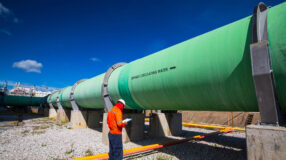Summary of Testimony
· INGAA represents interstate natural gas transmission pipeline operators in the U.S. and Canada.
· The shale revolution and the newly realized abundance of domestic natural gas have created new opportunities for the U.S. and have prompted significant and rapid changes in our nation’s energy economy. One of the principal areas in which this has occurred is in the use of natural gas as a fuel for electric power generation.
· There is no question that natural gas and natural gas pipelines can serve gas-fired electric power generation reliably. If natural gas is chosen as a fuel for electric power generators, the pipeline industry is confident that it can reliably meet the needs of these customers assuming that they contract for the appropriate natural gas transportation services.
· Concerns about natural gas/electric power reliability vary by region and depend on several factors. New England has attracted the greatest concern in recent years.
· The problem in New England is that wholesale electric market rules do not allow generators to recover the costs associated with ensuring electric reliability, and electric prices do not reflect these reliability costs. While generators in New England are acting rationally based on current market rules, the end result may be a reduction in electric reliability and a greater risk of blackouts that could be very costly to the region’s economy.
· The good news is that the interstate natural gas pipeline industry has a proven track record of building infrastructure in response to market demand. If the market provides timely signals that it needs additional capacity (in the form of firm contractual commitments for the capacity), the industry can add new pipeline capacity in a market-responsive manner.
· Pipelines are designed to meet the needs of shippers with firm contracts. Unlike electric utilities, pipelines typically are designed with little or no excess capacity (i.e., there is no reserve margin).
· The restructuring of wholesale natural gas markets has been a remarkable success. As demonstrated by pipelines’ robust infrastructure development over the past decade, the natural gas model works. This success should not be undermined as policymakers examine how to achieve greater natural gas and electric power market coordination.
· Market rules must be reformed to value investments in reliability and to ensure the ability to recover such costs from those who benefit from reliable electricity. With such arrangements, the necessary natural gas infrastructure can and will be built. Without such arrangements, there will be a much greater risk that parts of the nation will experience increasing blackouts, volatile power prices and degradation of the quality of service for natural gas utilities and other traditional natural gas pipeline customers.





